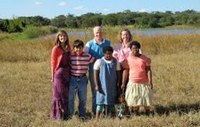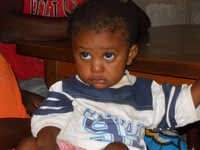![Madison Summer & Thanksgiving NYC 2010 028[2].jpg](https://wp-media.beliefnet.com/sites/113/import/assets_c/2010/12/Madison%20Summer%20&%20Thanksgiving%20NYC%202010%20028%5B2%5D-thumb-200x150-20200.jpg) When Penny first received a diagnosis of Down syndrome nearly five years ago, I was worried. I worried that she wouldn’t learn and that her health would be compromised and that she would live a difficult life. Then I found out about Early Intervention, a program for children with special needs from birth to three-years old which provides therapeutic assistance on a weekly basis. By the time Penny was two, four different therapists visited our home once a week to teach me how to help her grow and learn and flourish. Then the public school system came into play. Because Penny has special needs, she is “presumptively eligible” for all sorts of services, including free public education starting upon her third birthday. She receives Occupational Therapy, Physical Therapy and Speech Therapy weekly, and she attends a school with teachers who are trained to care for kids with special needs.
When Penny first received a diagnosis of Down syndrome nearly five years ago, I was worried. I worried that she wouldn’t learn and that her health would be compromised and that she would live a difficult life. Then I found out about Early Intervention, a program for children with special needs from birth to three-years old which provides therapeutic assistance on a weekly basis. By the time Penny was two, four different therapists visited our home once a week to teach me how to help her grow and learn and flourish. Then the public school system came into play. Because Penny has special needs, she is “presumptively eligible” for all sorts of services, including free public education starting upon her third birthday. She receives Occupational Therapy, Physical Therapy and Speech Therapy weekly, and she attends a school with teachers who are trained to care for kids with special needs.
On the medical front, shortly after Penny was born we discovered that we lived within an hour of the best children’s hospital in the nation (the Children’s Hospital of Philadelphia), with satellite offices even closer to our home. Not only that, we lived about a mile from the headquarters of the Special Olympics for New Jersey, and we benefitted from free programs to encourage her to develop as an athlete.
Therapy, school, play, and medicine. It was all handed to us. Pretty soon, I wasn’t very worried for Penny any more.
But my concerns soon spread outside the walls of our home, as I realized that a major reason Penny thrived and continues to thrive is the support we have from these specialists. And when I think of children with Down syndrome born into poverty–whether within the United States or, especially, in developing nations–then I worry again.

I met Eric and Holly Nelson and their three children–
Maggie (featured in a Perfectly Human piece a few months back), Mollie, and Sam–about a year ago. Maggie, Mollie, and Sam all have Down syndrome. All were adopted at about one-year old. They had lived in an orphanage in Brazil with little attention to any of their needs. They are delightful young people with loving parents. But Eric and Holly felt called to do more to serve the needs of families and individuals with intellectual disabilities, particularly across the globe, in Africa. So they started an organization called
Special Hope Network, and last spring, they moved to Zambia.
Special Hope Network exists to provide training and resources for families, orphanages, and schools with children with intellectual disabilities. For the next three weeks on Wednesday afternoons, I’ve asked Holly and Eric to share a story in our “Perfectly Human” column that highlights a child with an intellectual disability. I want to offer a glimpse of the challenges they face and the hope they bring. Moreover, it is my hope that you will join me in
making a charitable gift to Special Hope Network. Would you consider donating $25? $50? $100? One gift could make a world of difference to a child.
![Madison Summer & Thanksgiving NYC 2010 028[2].jpg](https://wp-media.beliefnet.com/sites/113/import/assets_c/2010/12/Madison%20Summer%20&%20Thanksgiving%20NYC%202010%20028%5B2%5D-thumb-200x150-20200.jpg) When Penny first received a diagnosis of Down syndrome nearly five years ago, I was worried. I worried that she wouldn’t learn and that her health would be compromised and that she would live a difficult life. Then I found out about Early Intervention, a program for children with special needs from birth to three-years old which provides therapeutic assistance on a weekly basis. By the time Penny was two, four different therapists visited our home once a week to teach me how to help her grow and learn and flourish. Then the public school system came into play. Because Penny has special needs, she is “presumptively eligible” for all sorts of services, including free public education starting upon her third birthday. She receives Occupational Therapy, Physical Therapy and Speech Therapy weekly, and she attends a school with teachers who are trained to care for kids with special needs.
When Penny first received a diagnosis of Down syndrome nearly five years ago, I was worried. I worried that she wouldn’t learn and that her health would be compromised and that she would live a difficult life. Then I found out about Early Intervention, a program for children with special needs from birth to three-years old which provides therapeutic assistance on a weekly basis. By the time Penny was two, four different therapists visited our home once a week to teach me how to help her grow and learn and flourish. Then the public school system came into play. Because Penny has special needs, she is “presumptively eligible” for all sorts of services, including free public education starting upon her third birthday. She receives Occupational Therapy, Physical Therapy and Speech Therapy weekly, and she attends a school with teachers who are trained to care for kids with special needs. 

